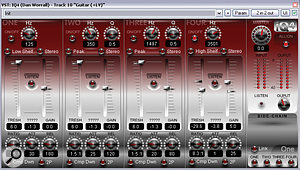I'm mixing a female pop/rock band and I'm struggling with getting the vocals to sit in the mix. They were recorded with a Rode NT1A straight into a Digidesign Digi 002 with the HPF switch in. The vocals are very dynamic and I've tried a variety of things to tame them. My plug‑in options are all the Pro Tools LE 8 crew, plus the Waves Musicians II bundle (Renaissance Vox, Compressor, EQ and a few others). I've experimented with serious volume automation, some EQ notching and different compression settings, but to no avail. It's the big, held notes that are the problem. I'm happy riding out the fast peaks, but the long notes always come across as harsh. Is it a matter of some well‑applied multi‑band compression or a side‑chained compressor stamping down on the harsh frequencies?
 Platinumears' freeware IQ4 dynamic EQ plug‑in can seem rather complicated to set up, but it's powerful enough to deal with some of the most intractable mix processing problems, such as harsh intermittent vocal resonances.
Platinumears' freeware IQ4 dynamic EQ plug‑in can seem rather complicated to set up, but it's powerful enough to deal with some of the most intractable mix processing problems, such as harsh intermittent vocal resonances.
Via SOS web site
SOS contributor Mike Senior replies: This isn't that uncommon a problem and sounds to me like one of the textbook applications for real‑time EQ changes. The problem is that some singers can create very powerful momentary resonances in their throat and mouth while singing and these, effectively, cause the levels of very narrow bands of harmonics to shoot through the roof. With shouty rock singers such resonances are often in the 6-14kHz region and can be exacerbated by insufficiently damped capsule resonances in cheaper mics. On the other hand, I've worked with an opera singer who produced a similar problem with projection resonances in the 1-2kHz region, so you just have to use your ears (and perhaps a high‑resolution spectrum analyser too) to home in on the offending frequency regions.
You've already found that fader automation and compression won't get you out of this scrape, and that's because neither deals with the underlying frequency balance issues. The nasty‑sounding frequency peaks will still be there no matter what level the overall signal is squished to. Likewise, ordinary EQ isn't much help either, because you often need quite dramatic notch-EQ cuts to smooth out the harsh notes, and these make the rest of the performance sound like the vocalist is singing through their scarf.
Possibly the simplest solution is to 'mult' the harshest notes to a separate track with its own, separate EQ setting. However, while this is comparatively quick, it's rarely precise enough to deliver really good results. A better‑sounding solution is to identify the problematic resonant frequencies (there are usually two or three) and then automate very narrow peaking‑filter cuts to ride their levels independently of the vocal signal as a whole. Tedious? Enough to make you consider Harakiri with your USB dongle.
If you don't fancy this messy demise, you'll be glad to know that there's another solution, although it does require the use of a forbiddingly complex type of audio processing called dynamic equalisation. This is where the gain controls of an EQ act like the gain elements of a dynamics processor, producing a kind of cross between equalisation and compression/expansion. By using dynamic EQ, you could set up a handful of EQ notches to target the harshest vocal frequencies, but then set up each band's dynamics threshold such that the gain cuts only kick in when those frequencies become loud enough to be irritating. If that sounds a bit tricky to set up, you're not wrong, but the upside is that it can work really well if you spend a little time configuring all the band parameters so that they precisely target the exact frequencies you're most annoyed by.
On a practical level, you don't actually appear to have a dynamic EQ plug‑in to hand, so you'd need to acquire something specifically for the purpose. On the face of it, multi‑band compression might appear to be suitable for the task, as it also combines elements of EQ and compression into a single algorithm. However, in reality, you usually need to control much narrower bands of frequencies than multi‑band compressors can typically isolate. Probably the most cost‑effective option, therefore, would be to use the (admittedly, brain‑meltingly configurable) freeware Platinumears IQ4 VST plug‑in within FXPansion's £55$99 VST To RTAS Adapter, as this would also make other freeware VST effects available to you in future. (Go to www.platinumears.com and www.fxpansion.com for more information.)
